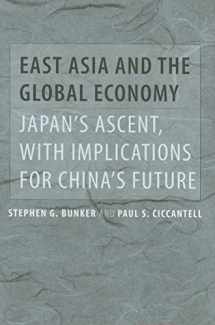
East Asia and the Global Economy: Japan’s Ascent, with Implications for China’s Future (Johns Hopkins Studies in Globalization)
Book details
Summary
Description
After World War II, Japan reinvented itself as a shipbuilding powerhouse and began its rapid ascent in the global economy. Its expansion strategy integrated raw material procurement, the redesign of global transportation infrastructure, and domestic industrialization. In this authoritative and engaging study, Stephen G. Bunker and Paul S. Ciccantell identify the key factors in Japan’s economic growth and the effects this growth had on the reorganization of significant sectors of the global economy.
Bunker and Ciccantell discuss what drove Japan’s economic expansion, how Japan globalized the work economy to support it, and why this spectacular growth came to a dramatic halt in the 1990s. Drawing on studies of ore mining, steel making, corporate sector reorganization, and port/rail development, they provide valuable insight into technical processes as well as specific patterns of corporate investment.
East Asia and the Global Economy introduces a theory of "new historical materialism" that explains the success of Japan and other world industrial powers. Here, the authors assert that the pattern of Japan’s ascent is essential for understanding China’s recent path of economic growth and dominance and anticipating what the future may hold.


We would LOVE it if you could help us and other readers by reviewing the book
Book review



